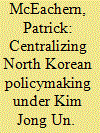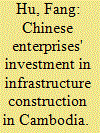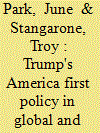|
|
|
Sort Order |
|
|
|
Items / Page
|
|
|
|
|
|
|
| Srl | Item |
| 1 |
ID:
164309


|
|
|
|
|
| Summary/Abstract |
Following the death of North Korean leader Kim Jong Il in December 2011, Kim Jong Un assumed power and gradually transformed the policymaking environment in the Democratic People's Republic of Korea (DPRK or North Korea). While some analysts expected the young and inexperienced leader to face greater hardship than his father in managing the country, in this article I argue that Kim Jong Un faced an easier transition. Kim Jong Un inherited an economy, inter-Korean relationship, and strategic landscape in foreign affairs in a relatively favorable position relative to his father's formal succession. From this position of strength, Kim Jong Un has centralized governance in the Korean Workers' Party (KWP) and his personal leadership. Drawing on internal documents and media, I show that inter-institutional debate previously observable between the party, military, and government has largely vanished under Kim Jong Un and the political roles of the military and government have receded from a comprehensive set of national policy questions.
|
|
|
|
|
|
|
|
|
|
|
|
|
|
|
|
| 2 |
ID:
164318


|
|
|
|
|
| Summary/Abstract |
One of the important means of promoting connectivity and cooperation between China and Cambodia is Chinese enterprises' investment in Cambodian infrastructure construction. The Belt and Road Initiative proposed by China brings both opportunities and challenges for Cambodia's economic development. Through an analysis of detailed case studies, in this article we review the background on Chinese infrastructure investment in Cambodia and identify factors in the approach to investment by Chinese enterprises in the Cambodian context that appear to underlie these challenges and suggest opportunities for improvements.
|
|
|
|
|
|
|
|
|
|
|
|
|
|
|
|
| 3 |
ID:
164315


|
|
|
|
|
| Summary/Abstract |
In this article I explore assumptions behind the aspiration for nuclear armament in South Korea. An increasing number of South Koreans advocate nuclear armament of their country, either by redeploying US tactical nuclear weapons or by developing an indigenous nuclear capability. Support for "going nuclear" reflects three beliefs: nuclear weapons can serve as a shield from external bullying, the balance of power between Seoul and Pyongyang has shifted due to Pyongyang's growing nuclear capability, and possessing nuclear weapons is the sole way to protect ROK national interests given growing skepticism over the credibility of the US nuclear umbrella. I revisit deterrence theory to demonstrate that these perceptions are based on the flawed assumption that nuclear weapons can only be deterred by other nuclear weapons. This assumption—an extrapolation from the Cold War experience—does not consider technological breakthroughs made since then. In fact, modern, technologically advanced conventional weapons can also deter nuclear weapons, especially those using relatively underdeveloped technologies. By continuously modernizing its conventional weapons and strengthening the ROK-US alliance, South Korea can deter Pyongyang from contemplating a nuclear assault on South Korea.
|
|
|
|
|
|
|
|
|
|
|
|
|
|
|
|
| 4 |
ID:
164312


|
|
|
|
|
| Summary/Abstract |
When do sanctions succeed in nuclear inhibition? Is there a generalizable framework to estimate sanction effectiveness against nuclear aspirants? Instead of relying on partial equilibrium analysis, we conceptualize sanctions as three sequential phases—imposition of economic pain, conversation to political pressure, and creation (or failure thereof) of zone of possible agreement (ZOPA). The effectiveness of each phase is subject to phase-specific contextual variables, an aggregation of which helps measure individual sanction's effectiveness, conduct cross-case comparison, and estimate one's replicability in other cases. To illustrate its analytical utility, we analyze the divergent sanction outcomes between Iran in 2012–2015 and North Korea in 2013–2017. Iran was economically more vulnerable and politically less resilient, and its bargaining position was closer to a ZOPA than North Korea was. Our analysis questions the utility of economic sanctions against North Korea and helps expand the discussion away from the policy obsession with the role of China. Theoretically, it rectifies an imbalance against qualitative and holistic approach in the sanction literature and contributes to discussions about nuclear inhibition strategies.
|
|
|
|
|
|
|
|
|
|
|
|
|
|
|
|
| 5 |
ID:
164310


|
|
|
|
|
| Summary/Abstract |
In this article we analyze the impacts of a hierarchical administrative tradition on new governance in contemporary South Korea, focusing on ground-level practices of the local network governance in supporting settlements of North Korean refugees. By employing an interpretive approach that seeks to decenter governance in terms of diverse and contingent actions of policy actors against the background of distinct traditions, the study attempts to explain ways in which network governance unfolds in everyday life. Despite the institutional transition from "government to (new) governance," a deeply rooted hierarchical tradition is entangled with relatively new democratic tradition, causing unintended policy outcomes at the ground level in generating confusion and resistance among frontline policy actors. As a result, new governance can be an empty rallying cry unless policymakers and practitioners take the meaning of bottom-up seriously.
|
|
|
|
|
|
|
|
|
|
|
|
|
|
|
|
| 6 |
ID:
164308


|
|
|
|
|
| Summary/Abstract |
Since the end of World War II, the United States has played a leading role in shaping the global economic system. While US influence has waned with the reconstruction of Europe and the rise of China, it has remained the leading power in the international system. The election of Donald Trump, however, represents a significant shift in US trade policy. In its first days the Trump administration withdrew from the Trans-Pacific Partnership and has since taken specific steps to renegotiate trade agreements and protect US industries. Politicizing the importance to reduce bilateral US trade deficits and to bring manufacturing jobs back home, the Trump administration has also utilized trade remedies in addition to the seldom-used safeguards to advance its "America First" economic agenda. Although trade remedy actions—the imposition of antidumping and countervailing duty based on the US Trade Act of 1974—have been critical instruments for US trade, prioritizing trade deficit reduction in US trade policy has the potential to erode the underlying international system and exacerbate rather than resolve the tensions that have spurred nationalistic economic movements. Against this backdrop, in this article we explore the implications of an abrogation of US global economic leadership for the international trading system and US influence more broadly. We also consider the implications for East Asia and the global economy as a whole as China, the European Union, and Japan take on larger leadership roles within the global trading system.
|
|
|
|
|
|
|
|
|
|
|
|
|
|
|
|
| 7 |
ID:
164316


|
|
|
|
|
| Summary/Abstract |
This study aims to identify the determinants of trust in other countries, focusing on US citizens' trust in Japan. The analysis of the data of the national Pew Research Center survey conducted in 2015 examines the determining influence of theoretical correlates, which draw from extant studies of international trust, including national images, goal compatibility, issue awareness, and historical memories. Images of the Japanese people as honest, inventive, and hardworking increase trust in Japan. US perceptions of historically inimical events in US-Japan relations do not influence current trust, and the comprehensive regression of trust in Japan on diverse correlates does not demonstrate a predicted cross-generational difference due to experiential distance from such events. A higher level of trust in Japan is observed among US citizens who think that Japan, despite its declining economy, should play a more active military role in the Asia-Pacific region. These US citizens tend to see Japan as a trustworthy partner, given the economic and military rise of China and the resulting goal compatibility (due to dealing with a common threat) between the United States and Japan.
|
|
|
|
|
|
|
|
|
|
|
|
|
|
|
|
|
|
|
|
|